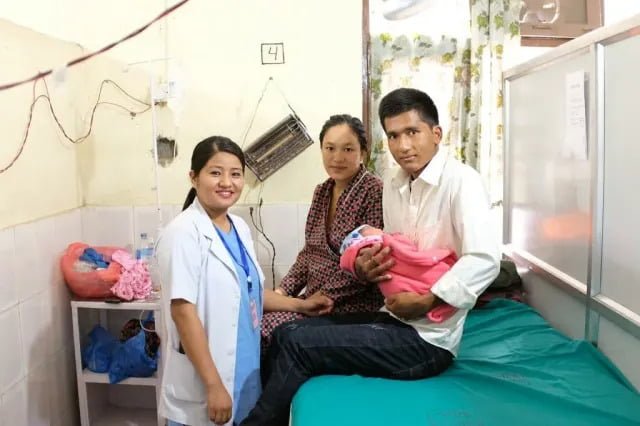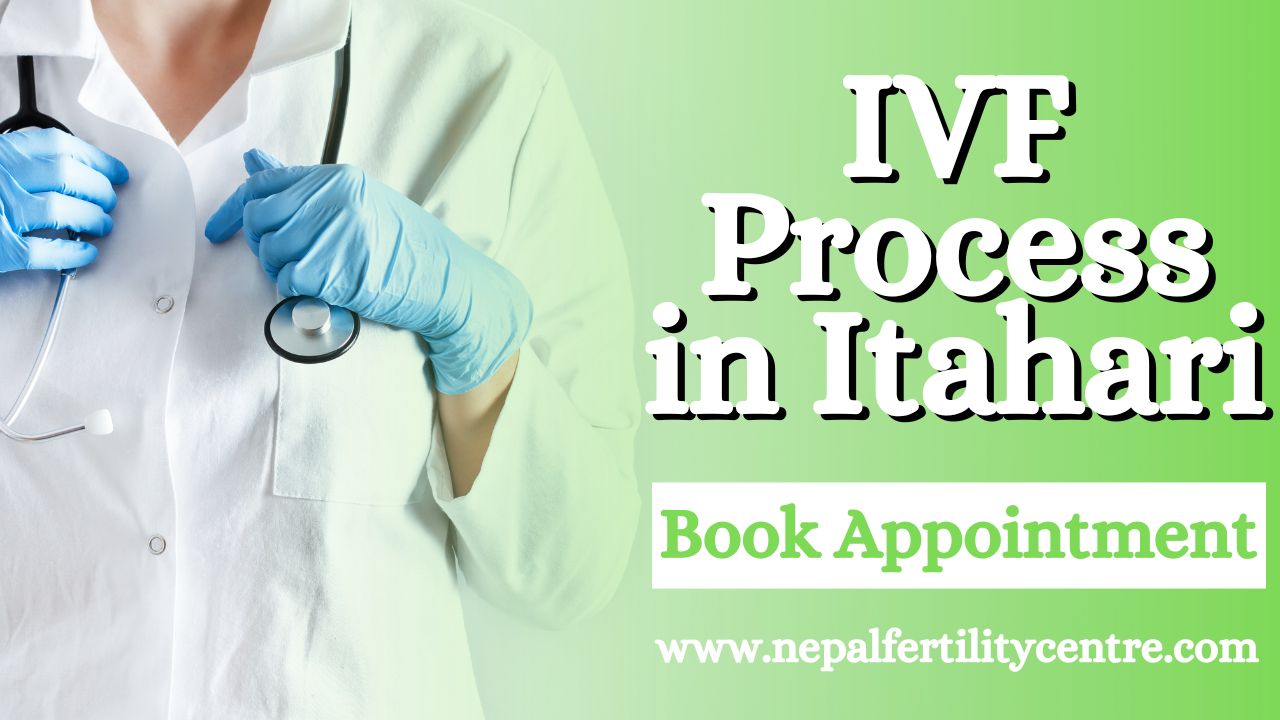In the charming city of Itahari, situated in the eastern piece of Nepal, the excursion to being a parent takes a remarkable turn with the coming of In Vitro Fertilization (IVF). This far reaching guide takes you through the complexities of the IVF process in Itahari, giving understanding into the neighborhood centers, the means in question, examples of overcoming adversity, and fundamental contemplations for couples seeking fertility treatments in this vibrant region.
Understanding IVF
In Vitro Fertilization (IVF) is a groundbreaking assisted reproductive technology that has provided a ray of hope to countless couples and individuals facing infertility. This perplexing methodology includes joining eggs and sperm outside the body to make incipient embryos, which are then moved into the uterus. IVF has changed the field of regenerative medication, empowering numerous to satisfy their dreams of parenthood. This article offers a comprehensive overview of the IVF process, its stages, benefits, and considerations.

IVF Process Step by Step
In vitro fertilization (IVF) is a complex and innovative fertility treatment that offers hope to individuals and couples facing infertility challenges. In Itahari, Nepal, IVF services have gained prominence, making parenthood dreams a reality for many. Here’s a detailed step-by-step guide to the IVF process in Itahari:
Initial Consultation
The journey begins with an initial consultation with a fertility specialist. During this crucial meeting, the medical history of both partners is reviewed, and any underlying issues are discussed. The fertility specialist may recommend diagnostic tests to identify the root causes of infertility. Based on this evaluation, the most appropriate fertility treatment, which may include IVF, is recommended.
Ovarian Stimulation
In the next phase, ovarian stimulation is initiated. This involves the administration of hormonal medications to the woman to stimulate her ovaries. The goal is to encourage the development of multiple mature eggs. Throughout this phase, the woman’s progress is closely monitored through ultrasounds and blood tests to track the growth and maturation of follicles (fluid-filled sacs that contain eggs).
Egg Retrieval
Once the eggs have reached an optimal size and maturity, a minor surgical procedure called egg retrieval is performed. This procedure is typically conducted under sedation to minimize discomfort. Using a specialized ultrasound-guided needle, the eggs are carefully aspirated from the ovaries. The collected eggs are then transferred to the laboratory for further processing.
Sperm Collection
Simultaneously, sperm is collected from the male partner or a sperm donor, depending on the circumstances. The collected sperm is then processed to isolate healthy and motile sperm for fertilization.
Fertilization
In the laboratory, the eggs and sperm are combined in a controlled environment to facilitate fertilization. This is where the magic of conception takes place outside the woman’s body. The fertilized eggs (embryos) are closely monitored over the following days as they develop and mature.
Embryo Transfer
Once the embryos have reached an appropriate stage of development, typically inside three to five days, at least one undeveloped embryos are chosen for move into the woman’s uterus. This is a negligibly intrusive technique that doesn’t generally need sedation. The picked incipient embryos are tenderly positioned into the uterus through the cervix utilizing a meager catheter. This step is basic, as it decides the potential for pregnancy.
Pregnancy Test
Following the incipient embryo transfer, there is a holding up period during which the women is encouraged to rest and keep away from demanding exercises. Roughly 10 to 14 days after the exchange, a pregnancy test is led to decide whether the IVF cycle was successful. A positive outcome demonstrates that pregnancy has been accomplished, and the lady will get continuous pre-birth care to screen the advancement of the pregnancy.
The IVF process in Itahari, Nepal, offers hope and possibilities for couples and individuals seeking to overcome infertility. This step-by-step guide gives knowledge into the far reaching excursion of IVF, from the underlying interview to incipient embryo move and then some. As Itahari keeps on laying down a good foundation for itself as a center point for fertility treatments, planned guardians can move toward the IVF interaction with certainty, realizing that they are upheld by experienced medical professionals and high level regenerative innovations.

Success Rates and Factors Affecting IVF Process
In vitro fertilization (IVF) has revolutionized fertility treatment, offering hope to couples facing various infertility challenges. The success of an IVF cycle depends on a multitude of factors, and understanding these can help individuals and couples make informed decisions on their journey to parenthood.
Factors Affecting IVF Success Rates
- Age of the Woman: Perhaps the most significant factor influencing IVF success is the woman’s age. Younger women tend to have higher success rates because they typically produce healthier eggs. As women age, the quality and quantity of eggs decline, making it more challenging to achieve a successful pregnancy.
- Quality of Embryos: The quality of embryos created during the IVF process is crucial. Embryos are graded based on their appearance and development. High-quality embryos are more likely to implant successfully in the uterus.
- Underlying Medical Conditions: Certain medical conditions, such as polycystic ovary syndrome (PCOS) or endometriosis, can affect fertility and IVF success rates. Treating these conditions before starting IVF can improve outcomes.
- Sperm Quality: Male factor infertility plays a significant role in IVF success. Poor sperm quality, low sperm count, or issues with sperm motility can reduce the chances of fertilization and successful embryo development.
- Lifestyle Factors: Lifestyle choices can impact IVF success. Factors like smoking, excessive alcohol consumption, obesity, and poor diet can negatively affect fertility. Maintaining a healthy lifestyle can improve the odds of success.
- Body Mass Index (BMI): Both underweight and overweight individuals may experience reduced IVF success rates. Achieving a healthy BMI before starting IVF can optimize outcomes.
- Previous IVF Cycles: The number of previous IVF cycles can influence success rates. If previous attempts have been unsuccessful, the underlying causes may need further evaluation and adjustments to the treatment plan.
- Stress and Emotional Well-being: Psychological factors can impact IVF success. Elevated degrees of stress and nervousness can influence chemical levels and possibly decrease the odds of coming out on top. Techniques for reducing stress and emotional support can be helpful.
- Protocol and Medication: The particular IVF convention and prescriptions utilized can influence success rates. Personalized treatment plans custom-made to a singular’s novel necessities can streamline results.
- Clinic and Medical Team: The experience and mastery of the fruitfulness center and clinical group assume a critical part. The likelihood of success can be increased by selecting a reputable clinic with a proven track record of successful IVF cycles.
Success Rates
IVF success rates are normally detailed as the level of cycles bringing about a live birth. It’s essential to interpret these rates carefully. Success rates can fluctuate broadly among facilities and might be affected by factors like patient socioeconomics and the center’s treatment approach.
Furthermore, success rates may not represent the profound and monetary cost of numerous IVF cycles. While the general success rates might be lower, individual encounters can fluctuate fundamentally.
Forthcoming IVF patients ought to examine what is going on with a fertility specialist who can give customized bits of knowledge and proposals in light of their medical history and extraordinary conditions.
Likewise, while IVF offers desire to numerous people and couples confronting infertility, it’s fundamental to perceive that success rates can be impacted by different elements. By understanding these variables and looking for master direction, people can settle on educated choices and upgrade their possibilities regarding accomplishing a successful pregnancy through IVF.

Emotional Support and Counselling During the IVF Journey
The journey through In Vitro Fertilization (IVF) is a path often marked by hope, anticipation, and, at times, emotional challenges. While the medical aspects of IVF are vital, the emotional well-being of individuals and couples undergoing the process should not be overlooked. Emotional support and counseling play a pivotal role in ensuring that the journey is not just physically successful but emotionally fulfilling as well.
Understanding the Emotional Rollercoaster
- Expectation and Hope: The decision to undergo IVF is typically fueled by a strong desire for parenthood. Expectations are high, and hope is often the driving force. However, with each cycle, there can be a rollercoaster of emotions as the outcome remains uncertain.
- Stress and Anxiety: The IVF process can be physically and emotionally taxing. The stress of medical appointments, injections, and the anticipation of results can lead to increased anxiety levels.
- Disappointment: IVF cycles may not always yield the desired results. Failed cycles or miscarriages can be emotionally devastating, and individuals and couples often need support to cope with these disappointments.
- Isolation: Infertility and IVF can make individuals feel isolated. It can be challenging to discuss fertility issues with friends and family, leading to a sense of loneliness.
The Role of Emotional Support and Counseling
- Providing a Safe Space: Emotional support and counseling offer individuals and couples a safe, non-judgmental space to express their feelings, fears, and frustrations. This can be immensely therapeutic.
- Coping Strategies: During the IVF process, counselors can teach people how to deal with stress and anxiety. These systems might incorporate unwinding procedures, care, and relational abilities.
- Managing Expectations: Individuals and couples can get counseling to set realistic expectations for their IVF journey. This can lessen the close to home effect of likely mishaps.
- Addressing Relationship Challenges: IVF can overburden connections. Counseling can assist couples in overcoming emotional obstacles together and enhancing their bond.
- Dealing with Grief: In instances of bombed cycles or premature deliveries, sorrow directing can give a system to handling misfortune and recuperating inwardly.
Types of Emotional Support
- Professional Counseling: Licensed therapists or guides with aptitude in fertility related issues can offer particular help.
- Support Groups: Joining support bunches with people going through comparable encounters can make a feeling of local area and approval.
- Family and Friends: Trusted family members can provide emotional support, but it’s important to choose confidants who are empathetic and understanding.
Generally, The IVF journey is something beyond a medical process; It’s also a very personal one. Basic encouragement and directing are vital pieces of this excursion, furnishing people and couples with the apparatuses they need to explore the profound ups and downs. By tending to the close to home parts of IVF, people and couples might not just increment their possibilities of a successful result at any point yet in addition rise up out of the process sincerely versatile and ready for the difficulties and delights of being a parent.

Why Choose IVF in Itahari?
The journey towards parenthood can be a challenging one, especially for couples grappling with infertility. In recent years, Itahari, a vibrant city nestled in the heart of Nepal, has emerged as a beacon of hope for those seeking to overcome fertility obstacles. This article explores the compelling reasons why many couples choose IVF (In Vitro Fertilization) in Itahari as their preferred path to parenthood.
- Expertise and Experience: Itahari boasts a cadre of experienced IVF specialists and healthcare professionals who have garnered recognition for their expertise in reproductive medicine. These specialists are well-equipped to diagnose and treat various causes of infertility, ensuring that patients receive the highest standard of care.
- State-of-the-Art Facilities: IVF clinics and fertility centers in Itahari are furnished with state of the art innovation and present day offices. They stick to global norms of value and security, offering couples admittance to the most recent headways in regenerative medication. This dedication to excellence increases the likelihood of an IVF success.
- Affordability: The cost of IVF treatment in Itahari is significantly lower than in many Western nations. Because of this accessibility, couples from a variety of backgrounds are able to investigate in vitro fertilization (IVF) as a possibility for establishing families without incurring prohibitive costs.
- Personalized Care: The individualized care that is provided to each patient is one of the distinguishing characteristics of IVF treatment in Itahari. The healthcare teams spend time getting to know couples and their particular circumstances and requirements before making treatment plans that are specific to them. Throughout the IVF process, this level of individualized attention fosters trust and confidence.
- Supportive Environment: Couples going through IVF frequently need emotional support to get through the emotional roller coaster that comes with fertility treatments. Itahari’s fertility clinics figure out this and proposition a strong and sympathetic climate. Patients get clinical consideration as well as everyday reassurance to assist them with adapting to the challenges of infertility.
- Cultural Sensitivity: Itahari is well-known for its inclusiveness and diversity of culture. IVF centers in the city embrace this variety, regarding patients’ social and strict convictions all through their treatment. During their IVF journey, this inclusive approach ensures that couples from diverse backgrounds feel respected and at ease.
- Accessibility and Convenience: Itahari’s central location in Nepal makes it effectively available to both neighborhood and worldwide patients. The city’s well-developed transportation infrastructure makes it easy for couples from different parts of the country to get IVF services there.
- Success Stories: Over the course of her career, Itahari has witnessed numerous success stories of happy couples who were able to realize their goal of having children through IVF. These stories of success give others who are starting their IVF journey hope and provide an example of what the city can accomplish.
Generally, choosing IVF in Itahari offers couples a convincing way to life as a parent, consolidating skill, moderateness, customized care, and a strong climate. Itahari is a city that welcomes cultural diversity and stands as a beacon of hope for couples trying to start families because it gives them the chance to make their childhood dreams come true.

Conclusion
In Vitro Fertilization has revolutionized the field of fertility treatment, offering desire to the people who once thought being a parent was far off. In Itahari, a developing number of people and couples are leaving on this excursion to satisfy their dreams about having a kid. With the right center, extensive information, and consistent reassurance, the IVF process in Itahari can lead to life-changing outcomes and happy fresh starts for families.
Frequently Asked Questions (FAQs)
1. What is IVF, and how does it work in Itahari?
IVF, or In Vitro Fertilization, is an assisted reproductive technology where eggs and sperm are combined outside the body. In Itahari, the IVF process typically involves ovarian stimulation, egg retrieval, fertilization in the lab, embryo culture, and embryo transfer.
2. Is IVF the right option for us in Itahari?
The suitability of IVF depends on individual factors like the cause of infertility, age, and medical history. Consult with a fertility specialist in Itahari to determine if IVF is the best treatment option for you.
3. What is the success rate of IVF in Itahari?
IVF success rates can vary depending on several factors, including age, the cause of infertility, and the quality of the fertility clinic. It’s essential to discuss success rates with your chosen clinic in Itahari.
4. How long does the IVF process take in Itahari?
The IVF process typically takes several weeks, from ovarian stimulation to embryo transfer. However, the exact timeline can vary depending on individual circumstances and treatment protocols.
5. Are there any risks or side effects associated with IVF in Itahari?
While IVF is generally safe, it can have side effects such as bloating, discomfort, or mood swings due to hormone medications. There are also rare risks like ovarian hyperstimulation syndrome (OHSS) or multiple pregnancies.
6. What is the cost of IVF in Itahari, and are there any financial options available?
The cost of IVF in Itahari can vary depending on the clinic and specific treatment protocols. It’s essential to inquire about the cost, including medications and additional procedures. Some clinics may offer financial assistance or payment plans to help with affordability.
7. Are there any lifestyle changes or precautions to take during the IVF process in Itahari?
Your fertility specialist in Itahari will provide guidance on lifestyle changes, including diet, exercise, and stress management. It’s crucial to follow their recommendations to optimize your chances of success.
Read Also:

